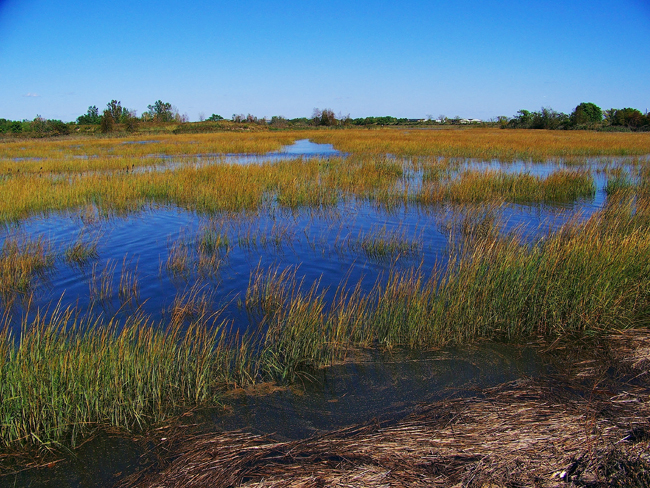
Great Meadows Marsh, a protected salt marsh in Stratford, CT. Credit: Courtesy of the town of Stratford
— By Joan Gralla for Newsday
Stony Brook, NY, March 9, 2023 - How different species of fish are changing places as Long Island Sound warms, how violent storms and algae outbreaks affect it, and whether gardeners will use less nitrogen-rich and thus polluting fertilizer are among the nine studies $6.3 million of new grants will make possible.
The projects, which will be conducted over two years with $4.2 million of federal aid and $2.1 million of matching funds, aim to “improve the conditions of the estuary for humans and wildlife, officials from the Connecticut and New York Sea Grant programs and the U.S. Environmental Protection Agency said in a statement on Monday.
Too much nitrogen — not just from gardens, but from wastewater systems flooding in storms and leaking septic systems — all have given the Sound a dead zone, with too little oxygen for life.
The nonprofit Save the Sound said last November that “trends towards improving open water quality in several portions of the Sound and poor grades in the bays have persisted.” And "previous gains in water quality may be threatened by rising water temperature in Long Island Sound.”
On Long Island, Stony Brook University researchers said they aim to bring recreation-deprived communities to the shore, by “designing and piloting on-demand shuttles,” they said.
By finding the remains of mollusks, long buried in the sea floor, Ithaca-based Paleontological Research Institution scientists hope to glean unique “location-specific information about levels of nitrogen relevant for decades-long time periods."
Robert Johnston, an economics professor at Clark University, said, “Residential lawn fertilizer has been among the most difficult nitrogen sources to predict and reduce across Long Island Sound watershed."
To devise more effective “lawn-care behavior change campaigns," Johnston said, a 2021 survey about nitrogen use by homeowners along the two-state Sound will be paired with “a water quality model” to assess how much nitrogen flows from what sorts of households and neighborhoods — but not, Johnston stressed, for any individuals or single parcels of land.
Stony Brook University’s Yong Chen, a School of Atmospheric and Marine Sciences professor, will study the mix of warm-water and cold-water fish — and the reasons.
“A typical example of warm water species is black sea bass, which were distributed in this area in the past, but their abundance increased greatly with warming habitat,” he said by email.
For cold-water species, such as winter flounder, however, “they either move into deep water and/or north.”
Maria Tzortziou, a professor of earth and atmospheric science at The City College of New York, will research how rising temperatures, excess nutrients, changing acidity and oxygen levels — and the weather — can affect harmful algal blooms.
“Observations of the entire ecosystem, over different seasons and across a range of conditions, including during extreme weather events, can be obtained from satellite data” and other means, to improve water policies.
“We can have images of the Sound within 3-4 hours (near-real-time data), to examine how these extreme events impact inputs of sediments, wastewater, and dissolved materials,” she said by email.
Devising ways to spot algae tides and how phytoplankton varies in the Sound also will be studied.
In Connecticut, mounds will be built from sediment in marshes, at different heights, with different plants, to see how these restoration projects perform and “their value for wildlife.”
By enclosing sections in salt marshes, so they heat more swiftly, researchers hope to discern whether “southern-sourced marsh grass (Spartina) strains” will outshine as Earth warms.
Another project will study the routes pathogens and fecal bacteria travel to reach two public beaches in Connecticut — New London’s Green Harbor and East Lyme’s Rocky Neck State Park — that “are among the most frequently closed or under swim advisories” because of these pollutants.
And the “coastal fish fitness” project will examine concentrations of PFAS, dubbed “forever chemicals” and used in everything from cookware to firefighting gear “at different water temperatures in fish populations downstream from the outfalls of public sewage treatment plants.” This is a five-decade project.
More Info: New York Sea Grant
New York Sea Grant (NYSG), a cooperative program of Cornell University
and the State University of New York (SUNY), is one of 34 university-based
programs under the National Oceanic and Atmospheric Administration’s
National Sea Grant College Program.
Since 1971, NYSG has represented a statewide network of integrated
research, education and extension services promoting coastal community
economic vitality, environmental sustainability and citizen awareness
and understanding about the State’s marine and Great Lakes resources.
Through NYSG’s efforts, the combined talents of university scientists
and extension specialists help develop and transfer science-based
information to many coastal user groups—businesses and industries,
federal, state and local government decision-makers and agency managers,
educators, the media and the interested public.
The program maintains Great Lakes offices at Cornell University, SUNY
Buffalo, SUNY Oswego and the Wayne County Cooperative Extension office
in Newark. In the State's marine waters, NYSG has offices at Stony Brook
University in Long Island, Brooklyn College and Cornell Cooperative
Extension in NYC and Kingston in the Hudson Valley.
For updates on Sea Grant activities: www.nyseagrant.org has RSS, Facebook, Twitter, Instagram, and YouTube links. NYSG offers a free e-list sign up via www.nyseagrant.org/nycoastlines for its flagship publication, NY Coastlines/Currents, which is published quarterly.